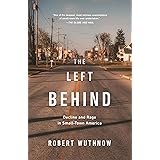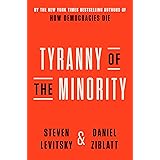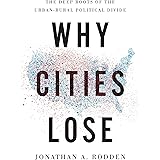
Download the free Kindle app and start reading Kindle books instantly on your smartphone, tablet, or computer - no Kindle device required.
Read instantly on your browser with Kindle for Web.
Using your mobile phone camera - scan the code below and download the Kindle app.

OK
 Audible sample Sample
Audible sample Sample 


The Politics of Resentment: Rural Consciousness in Wisconsin and the Rise of Scott Walker (Chicago Studies in American Politics) Illustrated Edition
With The Politics of Resentment, Katherine J. Cramer uncovers an oft-overlooked piece of the puzzle: rural political consciousness and the resentment of the “liberal elite.” Rural voters are distrustful that politicians will respect the distinct values of their communities and allocate a fair share of resources. What can look like disagreements about basic political principles are therefore actually rooted in something even more fundamental: who we are as people and how closely a candidate’s social identity matches our own. Using Scott Walker and Wisconsin’s prominent and protracted debate about the appropriate role of government, Cramer illuminates the contours of rural consciousness, showing how place-based identities profoundly influence how people understand politics, regardless of whether urban politicians and their supporters really do shortchange or look down on those living in the country.
The Politics of Resentment shows that rural resentment—no less than partisanship, race, or class—plays a major role in dividing America against itself.
- ISBN-10022634908X
- ISBN-13978-0226349084
- EditionIllustrated
- PublisherUniversity of Chicago Press
- Publication dateMarch 23, 2016
- LanguageEnglish
- Dimensions6 x 0.8 x 9 inches
- Print length256 pages
Books with Buzz
Discover the latest buzz-worthy books, from mysteries and romance to humor and nonfiction. Explore more
Similar items that may deliver to you quickly
Editorial Reviews
Review
“The Politics of Resentment is a breath of fresh air in the study of American public opinion. Intense partisan polarization has reached down into the ranks of everyday citizens’ perceptions of one another. Wisconsin is on the extreme end of this intense polarization that cuts along the lines of metropolitan liberals and non-metropolitan resentful conservatives, but these fault lines run deep across the nation. Cramer adds new dimensions of evidence and analysis to this dynamic. Her book will be widely read and debated, and it will help to reset the questions we ask about political worldviews in America.” -- Theda Skocpol, Harvard University, director of the Scholars Strategy Network
“Cramer spent years carefully listening to ‘ordinary’ people talking about politics and power, then used their words to produce an indelible portrait of the mind and heart of contemporary populism. The Politics of Resentment is the smartest, richest, and most humane work of political science I have read in a very long time.” -- Larry M. Bartels, Vanderbilt University
“Cramer develops a new theory and uses it to show how identity-based rural resentments animate much public opinion in Wisconsin. Governor Scott Walker’s success in cutting government and weakening unions makes Cramer’s study of Badger state politics especially important. This is pathbreaking work.” -- John Zaller, University of California, Los Angeles
"The Politics of Resentment is eye-opening. It has taught me more about my country than any other book or article I have read in many years." ― Journal of Communication
"The Politics of Resentment is an important contribution to the literature on contemporary American politics. Both methodologically and substantively, it breaks new ground." ― Journal of Sociology & Social Welfare
"One wishes more scholars followed Cramer’s lead. . . . this is a well-written and theoretically rich
book. Given recent events, it provides a much-needed corrective to the more journalistic accounts of white working-class voters, ones bereft of the rigor Cramer deploys. The Politics of Resentment, to my mind, is required reading to understand rural support for Scott Walker in Wisconsin; and also what might motivate Trump supporters more generally. Cramer’s book deserves all of the attention it’s received thus far." ― Public Opinion Quarterly
About the Author
Product details
- Publisher : University of Chicago Press; Illustrated edition (March 23, 2016)
- Language : English
- Hardcover : 256 pages
- ISBN-10 : 022634908X
- ISBN-13 : 978-0226349084
- Item Weight : 1.2 pounds
- Dimensions : 6 x 0.8 x 9 inches
- Best Sellers Rank: #7,413,667 in Books (See Top 100 in Books)
- #2,328 in Sociology of Rural Areas
- #6,815 in Elections
- #7,462 in General Elections & Political Process
- Customer Reviews:
About the author

Discover more of the author’s books, see similar authors, read author blogs and more
Customer reviews
Customer Reviews, including Product Star Ratings help customers to learn more about the product and decide whether it is the right product for them.
To calculate the overall star rating and percentage breakdown by star, we don’t use a simple average. Instead, our system considers things like how recent a review is and if the reviewer bought the item on Amazon. It also analyzed reviews to verify trustworthiness.
Learn more how customers reviews work on Amazon-
Top reviews
Top reviews from the United States
There was a problem filtering reviews right now. Please try again later.
Much of the news media still misses this viewpoint.
Much of the coastal Democrats still miss this viewpoint.
Not just insightful and instructive. Text is brisk and easy to read. Anecdotes are enjoyable means to convey truths. The author engaged in quite a marathon of travel and then repeat travel to get to know small groups of people throughout rural Wisconsin. This is not a "scientific survey" in the laboratory sense, but that's okay--those rural folks are not in laboratories, or in urban or suburban settings. People may see things differently when the population density is at the low end of the spectrum compared to the middle and high ends.
Rural is different. I've always known that. Thanks, Prof. Cramer, for making that visible.
I hope one or two will find this review helpful.
Upstate Wisconsin, north of Milwaukee and Madison, is mostly rural, overwhelmingly white, and accounts for about half the population of the state. From 2007 to 2012, Cramer interviewed some forty different groups, many repeatedly. These were people who met regularly, around the coffee machine in a service station, in the back room of a café, and so on. There was even a group that met to play a special Wisconsin dice game, at which Cramer excelled. The interviewees ranged from working class loggers in the north, to middle-class small-business owners. Over half were men, and many were older or retired. They appeared to be stable, established community members, sometimes political leaders. Cramer’s interviews bridged the election of Scott Walker in 2010 and the unsuccessful recall election against him in 2012. She published her findings in 2016 BT (Before Trump) as The Politics of Resentment.
She quickly identified a perspective she called “rural consciousness”: Her interviewees highly prized a self-sufficient outdoor lifestyle of low pay, privation, and hard physical labor; they viewed Madison and Milwaukee—“the M&Ms”—with suspicion and contempt. City folks, including professionals, government employees and academics—these led an easy life sitting behind desks, for which they were grossly overpaid. “Madison” (the capital) did not listen to rural folks, did not care about them, and looked down on them; it simply took their tax money and did not return their fair share in services. Just look at the empty streets and shuttered stores of declining small towns! In short, rural people, were “deserving”; those others were “undeserving.”
Cramer explored this resentment. Did rural areas really pay more in taxes than they got in benefits? In fact, the opposite—but that was irrelevant, since the locals regarded much government spending as “waste.” Was it the 2008 collapse and Great Recession? No. Small towns had been declining for decades; maybe only a bit more after 2008. Was it an ideological preference for low taxes and small government? No. They would gladly pay taxes for new school computers; but not on salaries for those lazy undeserving school teachers! Yes, even local school teachers were regarded as agents of “Madison”! Was it racism? Cramer did hear some openly racist remarks—directed at “lazy” residents of an upstate Native American reservation. Negative remarks about “those people in Milwaukee” may have meant racial minorities, but more often designated the despised urban elites, especially government bureaucrats. Cramer did discover one striking fact: in upstate communities the pay, benefits, and job security of public employees significantly exceeded those of private sector workers. Perhaps that helped make them lightning rods for resentment—and led to support for Governor Walker’s cuts in their pay and benefits.
Cramer probed: Why did people who complained of the high cost of health insurance in rural areas nonetheless oppose government efforts to expand health services? Over and over she heard something like, “the government must be mishandling my hard-earned dollars, because my taxes are going up and clearly they are not coming back to benefit people like me. So why would I want an expansion of government?”
In the end, Cramer was left with a mystery: rural resentment towards cities was hardly new. Nor was it new for politicians like Scott Walker to play to that resentment. But what made that resentment so powerful today and so focused on government at all levels?
Bitter resentment of government might seem plausible in a state like Louisiana given its inequality, corruption, and poor public services (see my review of Arlie Hochschild’s Strangers in Their Own Land in the November/December 2016 issue of Dollars & Sense). But in squeaky-clean Wisconsin? While the British Equality Trust rates Louisiana among the worst states on both inequality and social and health problems, it rates Wisconsin among the best. Wisconsin boasts excellent schools and health services statewide. Until Scott Walker, it was a reliably progressive Democratic state. What happened?
To me, it feels almost like a gathering religious movement, a rebellion against evil oppressors sometimes disguised as school teachers, postal clerks, and firemen. Is it in some twisted way a response to growing national inequality? There’s at least one small glimmer of hope: In the Wisconsin primary of April 5, Bernie Sanders got significantly more votes than any other candidate, including Donald Trump.
Her core argument concerns how rural resentment of urban people and their governments shapes both rural identity and their politics. It’s obviously a timely book in light of Trump’s ability to tap that resentment in a few key states such as Wisconsin. That said, there are some elements of Cramer’s findings that raised questions in my mind, questions that she leaves hanging. Without those answers, it’s hard to know how American politics should move forward.
One striking element of the conversations was that public employees in each community were grouped with state government. Someone raised in their town who taught at the local high school for thirty years was, in their worldview, resented as an agent of Madison. The people they grew up with have become villains in their eyes because they teach school. That’s not only sad, but it reflects a disconnection with reality. The high school math teacher who grew up in town is part of the community by any definition.
Another villain in rural Wisconsin is the Wisconsin Department of Natural Resources (DNR), which manages things like hunting and fishing, regulates pollution. Some of Cramer’s people talk about being afraid of the DNR catching them poaching deer or overfishing, both of which are illegal of course. In the same breadth, these people will say, “and the DNR rules don’t even work! The fishing is terrible these days, and there aren’t any more deer.” Apparently it does not cross their minds that their community of poachers might be responsible for the decline of deer and fish. These communities seem blind to a basic fact about how game management works.
That’s a nice illustration of how much cow manure came through in these conversations. Rural Wisconsin believes that they pay more taxes than the cities (they don’t), and that they get less state spending (they don’t). Cramer gently documents other things that just aren’t so, but she always says that it’s important for the rest of us to listen to these voices. I agree that we need to listen to these voices, some of whom are my neighbors too. I think it’s also important to think about where these voices are coming from – where are they getting these falsehoods? I have some thoughts, but I won’t share them here.
Having been heard, I think it’s important that the people rural Wisconsin do some listening of their own. For people who claim to believe in personal responsibility, they don’t take much responsibility themselves. If they believe that people can succeed through hard work, and if they really work as hard as they claim, why aren’t they succeeding? If, as they recognize, you need an education for the good jobs, why don’t they get an education? If there are no jobs in their community, why don’t they move where the jobs are? If gas is so expensive, why don’t they move into town? I’ve had my own conversations with people in these towns where they complain about their lazy, no-good relatives who won’t get off their behinds and get a job. Cramer didn’t seem to find many of these kinds of people in her samples.
Because of her research strategy, Cramer missed the rural Wisconsinites who moved to town and got a good job. Instead, she talked to the older generation, which tends to complain about their children and grandchildren having left these small towns for small cities like Eau Claire or Wausau. The old folks of rural Wisconsin might listen to their own grandkids.
Top reviews from other countries
Found the book, perhaps used used social science terminology which general public may not follow at first. Still gets 5 starts










